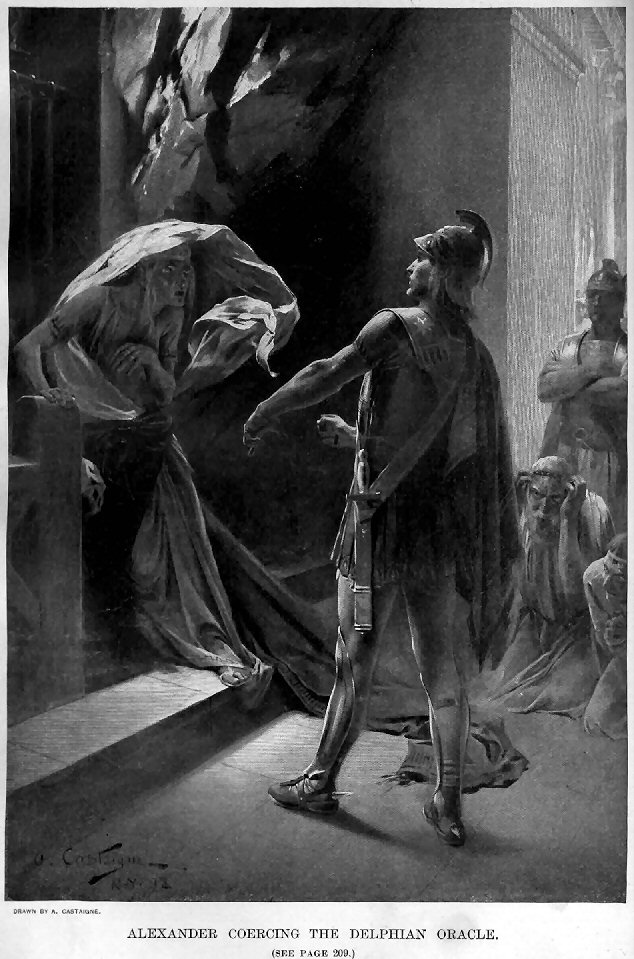Here is the Strabo from Perseus
(43) Having before spoken at length of the temple of Ammon, we wish to add this only, that in ancient times divination in general and oracles were held in greater esteem than at present. Now they are greatly neglected ; for the Romans are satisfied with the oracles of the Sibyl, and with Tyrrhenian divination by the entrails of animals, the flight of birds, and portentous appearances. Hence the oracle of Ammon, which was formerly held in great esteem, is now nearly deserted. This [p. 259] appears chiefly from the historians who have recorded the actions of Alexander, adding, indeed, much that has the appearance of flattery, but yet relating what is worthy of credit. Callisthenes, for instance, says that Alexander was ambitious of the glory of visiting the oracle, because he knew that Perseus and Hercules had before performed the journey thither. He set out from Parætonium, although the south winds were blowing, and succeeded in his undertaking by vigour and perseverance. When out of his way on the road, he escaped being overwhelmed in a sand-storm by a fall of rain, and by the guidance of two crows, which directed his course. These things are stated by way of flattery, as also what follows: that the priest permitted the king alone to pass into the temple in his usual dress, whereas the others changed theirs; that all heard the oracles on the outside of the temple, except Alexander, who was in the interior of the building; that the answers were not given, as at Delphi and at Branchidæ, in words, but chiefly by nods and signs, as in Homer; `the son of Saturn nodded with his sable brows,'84 the prophet imitating Jupiter. This, however, the man told the king, in express terms, that he was the son of Jupiter. Callisthenes adds, (after the exaggerating style of tragedy,) that when Apollo had deserted the oracle among the Branchidæ, on the temple being plundered by the Branchidæ (who espoused the party of the Persians in the time of Xerxes,) and the spring had failed, it then re-appeared (on the arrival of Alexander); that the ambassadors also of the Milesians carried back to Memphis numerous answers of the oracle respecting the descent of Alexander from Jupiter, and the future victory which he should obtain at Arbela, the death of Darius, and the political changes at Lacedæmon. He says also that the Erythræan Athenais, who resembled the ancient Erythræan Sibyl, had declared the high descent of Alexander. Such are the accounts of historians.
Kallisthenes says it was by nods and signs, not some clown hiding in a corridor; the statement that he was the son of Zeus would be Strabo paraphrasing the story of the priest's greeting 'O pai Dion' rather than the purport of the private consultation. I interpret that as meaning that Alexander was able to ask his questions in private in the inner court.
The secret chamber game was quite common in Hellenistic temples I wonder if it was a later addition, although there are earlier Egyptian examples too, it does seem to betoken a change in the method of divination.
Andrew I was not accusing you of having anything to do with the Siwah part (the urge to rag you by name would have been irresistable!); it just seemed incongruous to have that tacked on at the beginning. Having Perdikkas die in battle one can allow but making Alexander, an arch manipulator, the dupe of a temple priest was hard to take.
For the record I do disagree with your interpretation but only on the grounds that Strabo places the Sema elsewhere and he had been there or am I mistaken; it is not my area of expertise. I just think the true site has been built over for centuries, if only the Sultan had had a Prince Charles to promote the interests of retro-chic in architecture!

